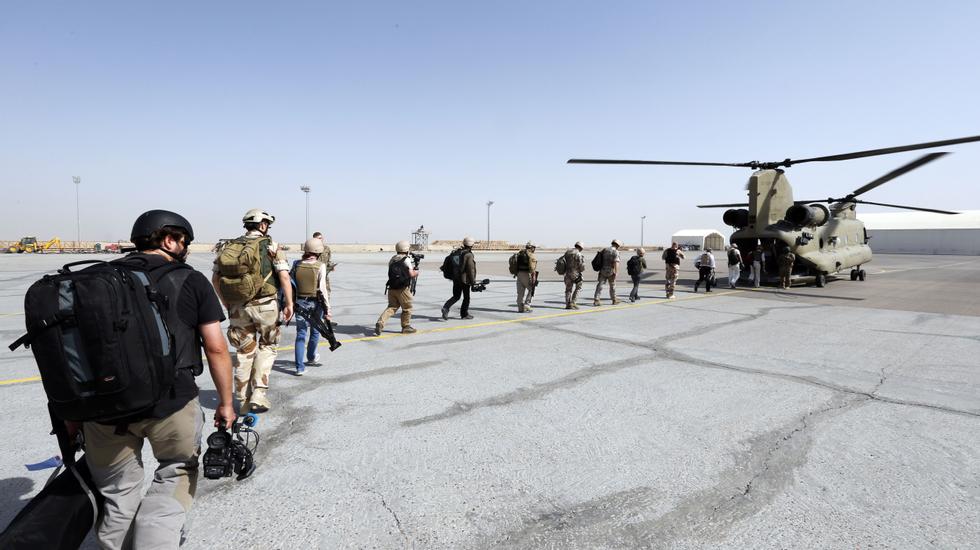On Wednesday, the NATO countries decided that the withdrawal from Afghanistan should start by 1 May, and the United States wants it to be completed by 11 September, as it is 20 years since the terrorist attacks that led to the invasion.
– It is a historic decision, says Chief of Defense Eirik Kristoffersen to NTB.
Norway currently has around 95 defense personnel in Afghanistan. These are mainly distributed on a sanitation mission where Norway is involved in running an important field hospital in Kabul, and special forces that are mentors for the anti-terror police in Kabul.
These forces will be among the last NATO forces to leave Afghanistan. Exactly when that will happen is not yet clear. Their security situation is also uncertain.
Prepared for new attacks
Following an agreement with the Taliban, the international forces were to leave Afghanistan by 1 May. The Taliban has complied with the agreement and has not attacked foreign forces since it was signed, Kristoffersen says. What happens from May 1 until NATO is out of Afghanistan, however, is unclear.
– The withdrawal will take longer than that, and the Americans have said that it will happen by 11 September. We are prepared for the Taliban to resume attacks on Western forces, which they have said are an option. The plans for the withdrawal take into account that we receive a threat from the Taliban, and the safety of our people is the most important thing in that planning, says Kristoffersen.
The Chief of Defense says there are natural reasons why the Norwegian forces are among the last to leave Afghanistan. The field hospital is important to maintain as long as NATO has forces there, and the special forces’ mentoring role for Afghan police forces is important for stability.
– That mentoring assignment, can you finish it satisfactorily?
– We have been training them since 2007, and what we now call is a mentoring assignment, which means that we follow them on the operations, but mostly they solve the operations themselves. We will never finish training and practicing, nor will the Afghan police unit, but our people have given them good training, says Kristoffersen.
(The article continues below the picture)
Chief of Defense Eirik Kristoffersen says it was a historic day when NATO decided to withdraw from Afghanistan, but that there is a danger of new attacks from the Taliban. Photo: Gorm Kallestad / NTB
—-
The Chief of Defense points out that although it was a political decision to withdraw, military professional advice has been given on how it can be done in the safest possible way.
– A fairly detailed plan has been drawn up for how we are to draw out the forces in a responsible manner and get the equipment we are going to, says Kristoffersen.
Got to sneak into the vaccine queue
The extraction will be a big logistical task. A task force is sent from Norway to help prepare the material and then transport it home to Norway. The corona situation makes that task extra demanding.
But the Norwegian forces in Afghanistan have already been vaccinated, says Kristoffersen. They got “sneaked” into the vaccine queue.
How NATO withdraws may, among other things, be the subject of negotiations with the Taliban, Minister of Defense Frank Bakke-Jensen confirmed to NTB on Wednesday.
– The Taliban has achieved considerable political recognition, so they have a position that it has been a long time since. So the wisdom of the Taliban is that they should enter into negotiations, says Kristoffersen.
The Chief of Defense does not see any concerns in the fact that what has been NATO’s counterpart on the battlefield is now at the negotiating table.
– That a conflict ends with negotiation is something we as military historically are used to. Personally, I am very happy that the Taliban is willing to enter into negotiations, says Kristoffersen.
Characterized an entire defense generation
The Chief of Defense says the Afghanistan mission has affected an entire generation in the Norwegian Armed Forces.
– Resources are released when the mission is now over, but not violent resources. We have many experiences that we will take with us further both in the defense of Norway and future operations abroad, says Kristoffersen.
He points out that Norwegian soldiers have shown that they can solve difficult situations where it has at times been difficult to distinguish between civilian and enemy, that NATO has shown unity throughout the period, and that the Norwegian Armed Forces has become better at cooperating with others actors.
– So we have gained experiences that will affect many of us who are in the Armed Forces, our entire careers, says the Chief of Defense.
– .

:strip_icc():format(jpeg)/kly-media-production/medias/2706260/original/002778300_1547710459-ben-white-148435-unsplash.jpg)
